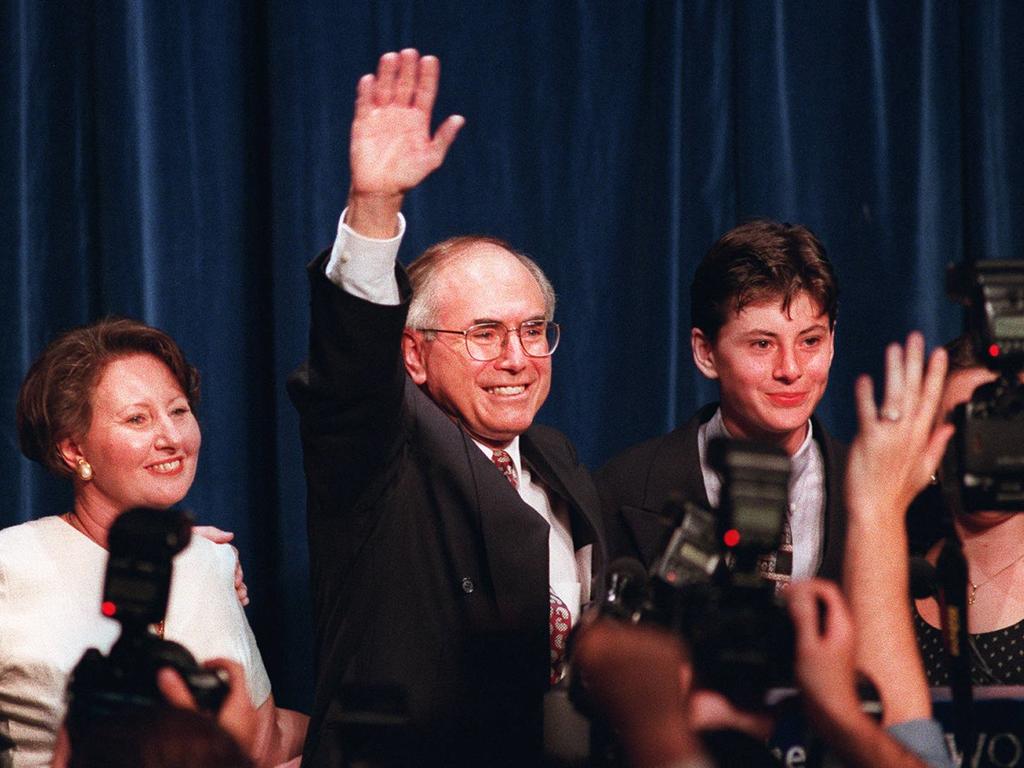
I interviewed Stone several times over the past decade, at his home and on the phone, and we exchanged emails. He was fascinating to talk to, and could be charming and witty. He offered unvarnished assessments of treasurers he worked with, from Billy Snedden, Frank Crean and Jim Cairns to Bill Hayden, John Howard and Paul Keating.
He was critical of every treasurer he served. But, on reflection, he rated Keating highly and Howard less so, but thought he was hamstrung by Malcolm Fraser’s cautious approach to economic reform. He had some respect for Hayden, who restored a degree of credibility to the Whitlam government in 1975.
After studying at Oxford on a Rhodes scholarship, Stone joined the Treasury in 1954. He thought Robert Menzies, then in power, was the best Liberal prime minister. He put Howard a close second among Liberals. He judged Bob Hawke, a contemporary at Perth Modern School, the best of the Labor prime ministers.
He liked to hold court with journalists at the bar of the National Press Club on Fridays. His minutes to treasurers could be devilishly funny and typically forthright. Some got him into hot water with colleagues. Hayden told Treasury secretary Frederick Wheeler over bottomless glasses of whisky to go easy on his deputy.

In 1974, Stone wrote to Crean warning not to engage commodities trader Tirath Khemlani to negotiate a $US4bn loan from Middle Eastern lenders. It was revealed by journalist Alan Reid in his book, The Whitlam Venture (1976). It was assumed Stone leaked it. In fact, it was Crean, who opposed the loan and was removed as treasurer before the loan terms were agreed.
Stone recalled, with relish, casting a vote for Labor in 1972. He thought Billy McMahon was a hopeless prime minister and an embarrassment to the Liberal Party. He voted Labor only one more time: in 1983 when Hawke returned the party to power. He thought the Fraser-Howard government had a been dreadful economic manager. Stone celebrated the Coalition’s defeat at a party at his home.
In 1971, after posts in London and Washington, Stone became Treasury deputy secretary. Wheeler, too, was a masterful old-school mandarin who had considerable authority and influence. Stone recalled Wheeler was “a superb administrator” but there was rivalry between them. There were four treasurers in the Whitlam government, beginning with Gough Whitlam. Stone thought Whitlam had “immense ability” but his government unravelled like a “Greek tragedy”. Stone liked and respected Crean but thought he “wasn’t up to the job”. He thought Cairns was “economically illiterate” and lacked the “intellectual confidence” to argue against the Treasury view. He respected Hayden who inscribed his autobiography to “John – always a passionate man”. Stone thought Howard was “weak” and “overshadowed by Fraser” on economic policy. On the eve of the 1983 election, Stone advised that the budget deficit, estimated at $1.6bn, was now about $9bn. This was not revealed before polling day. Stone said Hawke and Keating “were inheriting a bloody mess”. They made much of the updated Stone minute on the $9.6bn deficit.
When Keating became treasurer, many thought Stone would be given his marching orders. Keating thought this would be unwise given Stone’s profile and status abroad. The last thing the returned Labor government should do, Keating recalled, is arrive in town and “shoot the sheriff”. Keating never seriously contemplated sacking Stone. They actually got on well. Stone recalled Keating as “hardworking”, “confident” and also “good fun to be with”. When he resigned as Treasury secretary in 1984, Stone criticised the government’s processes and policies but was personally complimentary towards Keating. The treasurer drained a bottle of Veuve Clicquot with his departing secretary.

When Hawke and Keating floated the dollar, Stone was opposed. Reserve Bank governor Bob Johnston advocated a float. Stone told me he was not fully aware of Keating’s discussions with Johnston or others in Treasury such as Ted Evans and David Morgan about a float. Stone favoured an “evolutionary” approach, he explained.
The float of the dollar is the most important economic reform of the past half century, probably longer. Stone got it wrong. As a result, the decision weakened Stone and Treasury. It gave the Reserve Bank authority over monetary policy. Keating, however, ensured Stone’s views were heard. Hawke disregarded Stone entirely.
Often characterised as a champion of neoliberalism, economic rationalism and free-market thinking, Stone was often anything but. In opposing the float and the slashing of tariffs in 1973, he reflected an old Treasury view. There was no straight line in his thinking. Context and timing, he argued, explained the zigzags.
He served as a National Party senator (1987-90) and supported the absurd “Joh for PM” campaign.The less said about that the better. Howard sacked him from the Coalition frontbench when he urged Asian immigration be slowed in 1988. He later returned. In 1990, Stone resigned from the Senate to run for a lower house seat but was not elected.
In later years, Stone drifted further to the right and was a prominent contributor to policy debates, took positions with think tanks and wrote articles for newspapers and journals. He could still be prickly when criticised and held nothing back in his assessments, usually poor, of politicians and public servants. He maintained that every government spent and borrowed too much.
He lamented how his department had lost its authority. “Treasury has been vastly diminished over recent decades,” he told me. Treasury seems unwilling to speak truth to power, its forecasts are routinely wrong and it no longer has the status it once did.
The Stone Age is indeed a bygone era.






John Stone, Treasury secretary from 1979-84, was a formidable public servant. Hugely intelligent, bureaucratically shrewd, always controversial and colourful, he could also be arrogant and stubborn, and was on the wrong side of some policy issues. His death last week at age 96 is a reminder of the decline of the once all-powerful Treasury Department.